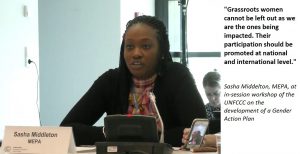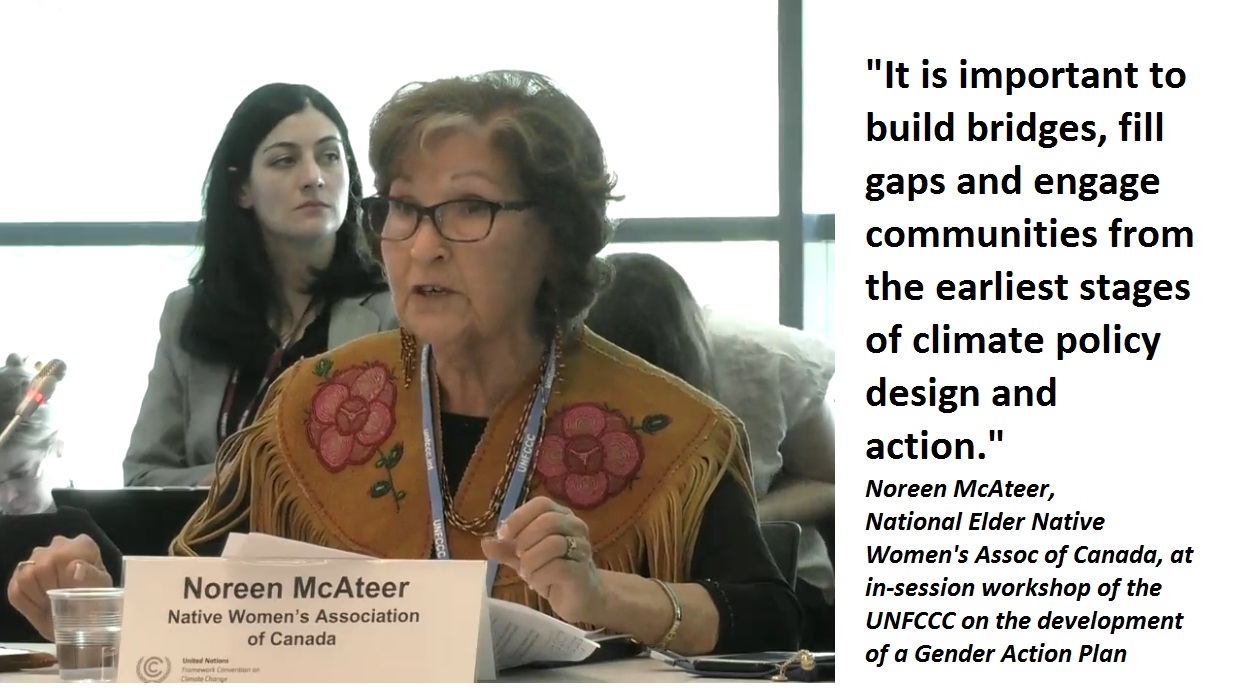Achieving gender balance under the UNFCCC and delivering gender responsive climate action was the subject of discussion at a two-day Workshop held at the 46th Subsidiary Body for Implementation (SBI 46), 10–11 May in Bonn.
Chaired by Winfred Lichuma (Kenya) and Geert Fremout (Belgium), the workshop on developing possible elements of a Gender Action Plan (GAP) was mandated by the COP in Marrakech to support the implementation of gender-related decisions, and mandates under the UNFCCC. Open to Parties and Observers the workshop considered lessons learned from other processes, reviewed gender decisions, governance options and interaction with other UNFCCC processes, and consulted the submissions on gender and climate change of both Parties and non-parties.
Opening the Workshop, Executive Secretary of the UNFCCC, Patricia Espinosa, spoke about how gender equality is a topic which is very close to her heart. She added that on Monday 08 May she joined the International Gender Champions and affirmed her commitment to the Gender Parity Pledge. The Parity Pledge means that Ms Espinosa will request organisers of any event at which she is speaking to ensure gender balance among the panellists.
Chief Negotiator for the incoming Fijian COP Presidency, Ambassador Nazhat Shameem Khan, spoke of how “the value of dialogue is that you listen and that you learn as much as you speak, you share experiences in a non-judgemental manner and you empower each other with the process of listening and learning”. She commended the Listening and Learning Dialogue from the previous evening relating it to a similar cultural concept in Fiji for listening and learning; ‘talanoa’.
Key messages from the previous evening’s Listening and Learning Event were transmitted to the UNFCCC GAP Workshop through a submission to the GAP Workshop by the Foundation. Grassroots women Sasha Middleton from Antigua and Barbuda and Noreen McAteer, a Native Elder from Canada also fed back key messages during the Opening Session of the GAP Workshop. Emphasising the need to enable the participation of grassroots women in climate policy decision-making, Sasha explained that, as grassroots women, ‘our voice matters’ and that the learning circles were extremely effective in bringing together grassroots women and climate negotiators to discuss gender responsive climate action. She told the participants at the GAP Workshop that ‘we can’t be left out because we are the ones being impacted by their decisions’.

Noreen highlighted how ‘communication is key’. She spoke about how there is a gap between knowledge of climate impacts at the grassroots level and climate change knowledge at the global level. In order to hear everyone’s voice and ensure a holistic approach to climate change, Noreen said ‘it is important to build bridges, fill gaps and engage communities from the earliest stages of climate policy design and action’.
During the first day of the GAP Workshop , the following topics for working groups were identified and agreed upon:
-
- Working Group A – Capacity building, knowledge sharing and communication
- Working Group B – Gender balance, participation and women’s leadership
- Working Group C – Coherence within the UNFCCC and other UN agencies
- Working Group D – Gender-responsive implementation and means of implementation
- Working Group E – Monitoring and reporting
During the second day of the GAP Workshop, Parties engaged in one of the five working groups to identify result areas and possible activities for the GAP. During the working group discussions, Parties and Observers came together to agree on result areas and activities that would support the implementation of existing gender mandates under the UNFCCC. Modalities to achieve gender balance featured strongly including ensuring gender balance in co-leadership or rotating leadership positions; when nominating members of new expert groups and prioritising funding; training and capacity building should be provided to support women from LDCs and SIDS, indigenous women and young women to participate actively in the UNFCCC. Many of these suggestions are recommendations in the Full View, a research publication by the Foundation and UN Women. Enabling the participation of grassroots women was also a focus of discussions in the working groups with suggestions that resources be dedicated to support the meaningful participation of grassroots women in the UNFCCC process, so that climate action design and implementation can benefit from their local and traditional knowledge.
During the final session of the two-day workshop, the five working groups presented the results of their discussions in plenary. At the end of the workshop, the facilitators announced that the Secretariat would incorporate the outputs of the working groups in an informal workshop report which was published on the UNFCCC website. It was noted that the next step in the process is for the subsidiary bodies to develop the GAP at SBI 47 in November and that the informal workshop report from Bonn will act as an input into that process.
Related Links
Our Work – Women’s Leadership on Gender and Climate Change
Our Work – Women’s Participation An Enabler of Climate Justice


